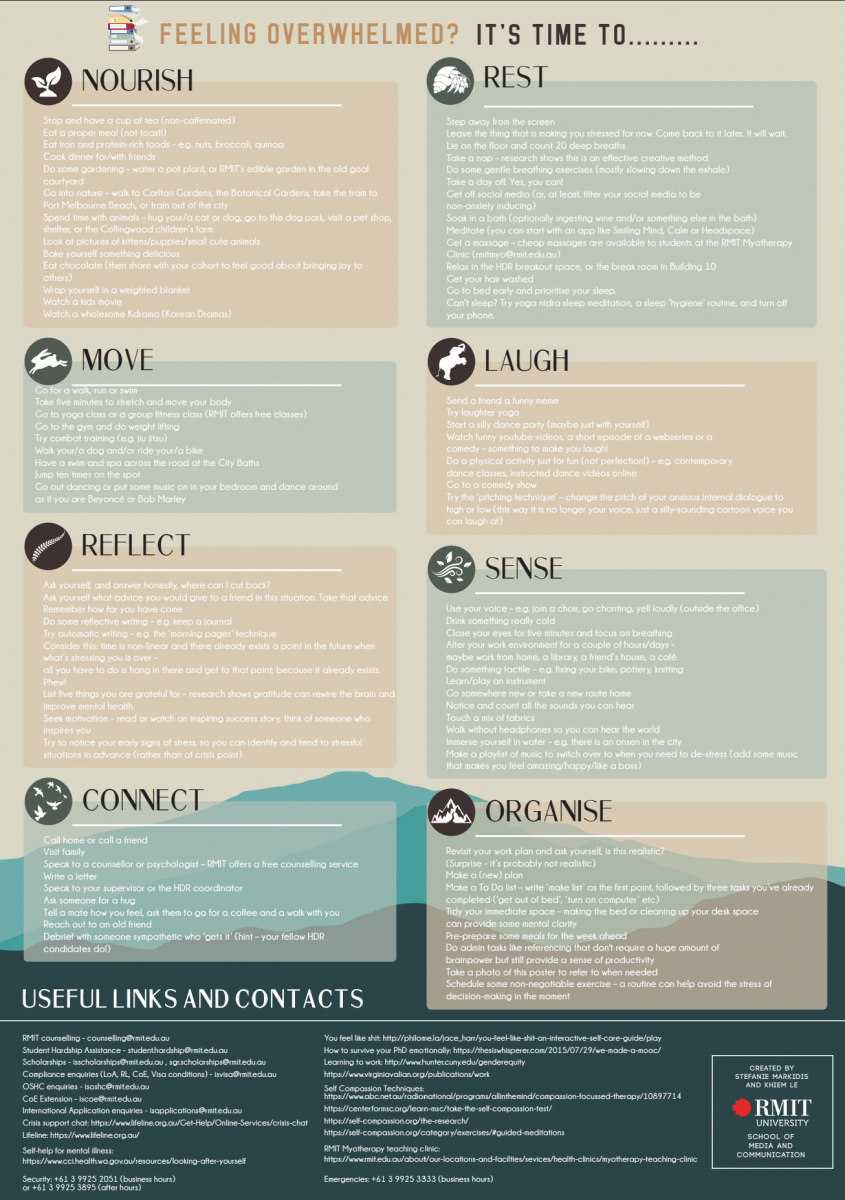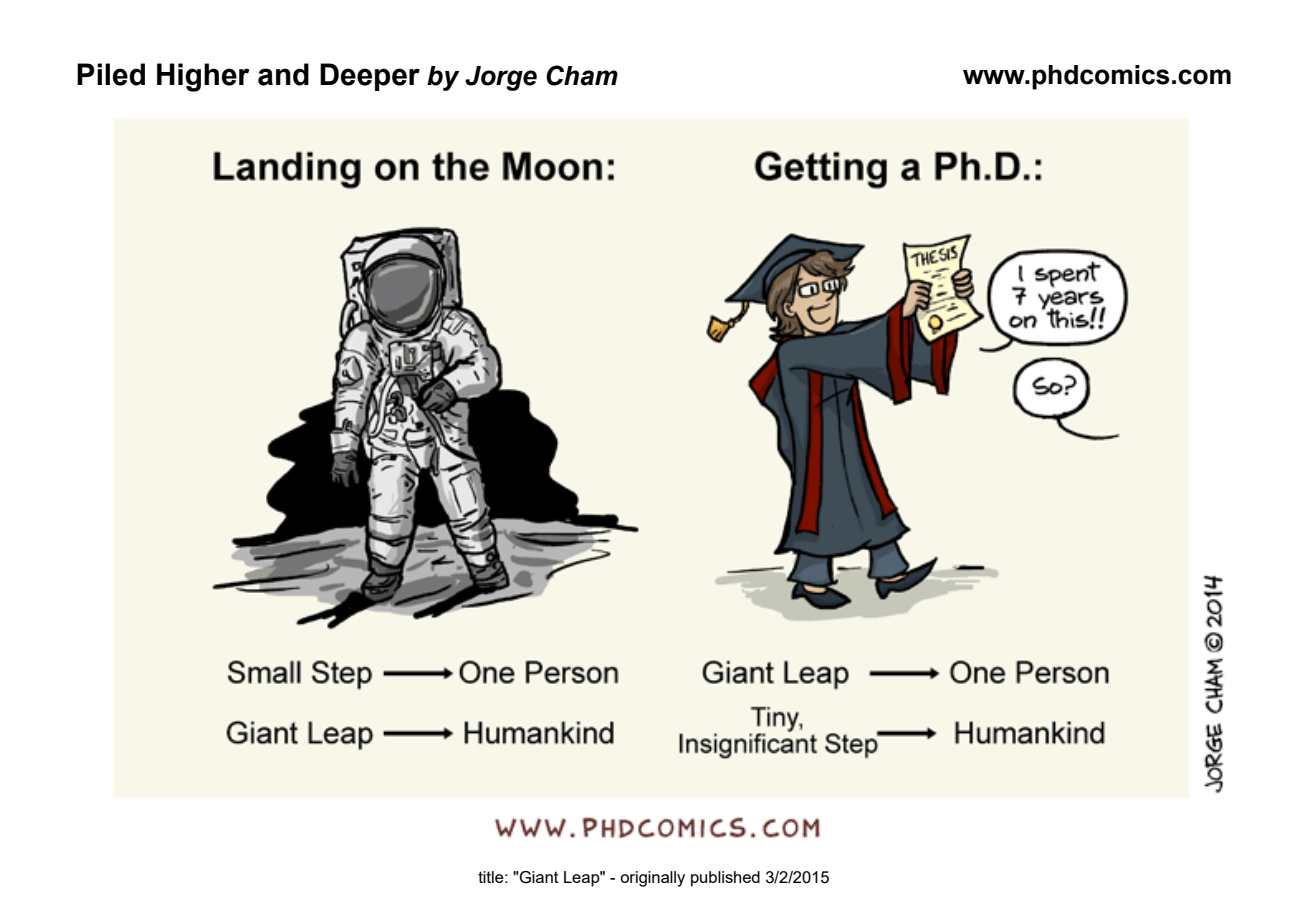Mental Health in PhD International Students
“One reward for PhD students, and academia in general is this sense that your work can have a real life effect in the world.”
PhD students are often a minority and because of that, they are also sometimes overlooked. It is no easy feat to be able to do a PhD and it is an opportunity many fight for. They must be smart and accomplished individuals. But what most people know about these students are only the glaze on top of the actual experience. No one raises the fact that almost half of PhD students quit halfway into their research.
It’s obvious that doing a PhD isn’t easy, but many are unaware of how difficult it can be. Many students struggle mentally throughout their course of study.
“Honestly, no one knows what they are doing until they click that submit button,” said William Antony Yanko, an RMIT University research student. He had thought the path in doing a thesis is clear, but it is far from straightforward.
The Conversation found that most, if not all research students suffer from depression and anxiety. Not only are they more vulnerable, but William also says that International PhD students such as himself might be carrying more weight in their research, and they’re less likely to ask for help.
Many of the students came to Melbourne as a result of their home country’s government scholarships. There is a ticking time clock to complete their research so changes in life that affects their research can negatively impact the student’s stress levels.
“I didn’t realize how much pressure I have until I moved here from Indonesia,” William said.
Moreover, some students bring their family in during their research and have to provide for them as well. Research on International PhD students show that students who bring dependents have increased demand for different roles; As a student, a spouse, a parent, and as an employee.
Swinburne PhD club president and research candidate, Errol Phuah, recognises that this is a common occurrence with his fellow international researchers.
“It offers its own challenges with financial stability,” Phuah responded.
But a factor that is shared among international and domestic PhD students is the relationship with supervisors. Good and supportive relationships between the supervisor and the student is critical in the research student’s progress towards completing their thesis.
Every research candidate is paired with two to three supervisors who will become a mentor and guide to them. Supervisors help set their goals, provide reviews and feedback until your thesis is submitted. If there’s a question, or if you need help, you ask your supervisor.
For William, it’s important to be able to find a supervisor that can connect with and understand him. “I need to be able to discuss with my supervisor, because I can’t talk to anyone else about it, they don’t understand,” he explains.
Coping with #PhDlife

Image provided by Khiem Le and Stefanie Markidis
University Student unions provide students with events, free food and drinks, but it attracts mostly undergraduate students, that in fairness occupies most university enrollments. As a result, it leaves International PhD students to rely on support systems that’s far away. I.e. family back home.
With hurdles and obstacles in PhD life, everything can suddenly become overwhelming. PhD candidates can become isolated with their research that they begin to overlook everything else.
“You’re just focused on your own world, looking at your computer, you’re not going to care who’s sitting next to you or behind you,” William told me.
So I spoke to Stefanie Markidis, local research candidate and mental health advocate, who urged her colleagues to take time out once in a while. “PhD students are often very bright, driven and invested in their research. It is easy to give everything to the research and forget to rest or to take time out”.
Stefanie, together with her peers, initiated a poster for PhD candidates that list things to do when you feel overwhelmed.
The poster gives you simple activities to de-stress and refresh without having to think about what to do.
“These small things can help me to change my perspective toward the problem. As simple as taking a walk and being aware in the moment” Stefanie said.
Furthermore, peer support can go a long way. Socializing and looking after each other is good when one of your coworkers is at a low point.
“We can support each other. We do this by building communities of care. We do this by looking after ourselves, so we can look after each other” She added.
Phuah wished more representation in the postgraduate category, especially international student representation “This could be made more appealing…with some form of honorarium to cover living costs”.
He also strongly encouraged PhD candidates to use their University free counselling service. “It helps having professionals on site you can make an appointment with and talk to, they can contact the graduate school and provide their own professional recommendation on how a particular student can be better supported.”
Some PhD students (local and international) often take refuge in memes to joke lightly on their stress. #PhDlife on instagram and Tumblr is a funny compilation on the love-hate relationship students have with their research.
Loving your PhD

Even though PhD life sounds terrifying, there’s a beauty in pursuing academia. Stefanie, who’s doing research on eating disorders and writing, is motivated to use her work to help people who’re struggling with mental health.
“One reward for PhD students, and academia in general is this sense that your work can have a real life effect in the world.”
Same can be said for Wlliam, who’s researching Indonesian Hip-Hop music. His progress taught him to be more professional, analytical, to understand yourself and your limits. “It helped me become a stronger person, to know what I can and can’t do”.
On a lighter note, I asked both Stefanie and William what typical PhD student myths they’d like to debunk.
William asked me to pass the message that PhD students, local or international are not ‘smart’.
“We’re smart in one topic. Not all,” he explained.
Stefanie, on the other hand, wanted to let everyone know PhD students aren’t all hermits,“we’re not hiding at university as ‘eternal students’ because we have nothing better to do!”
A little more appreciation should be given to our academic friends, who bury their heads in an endless amount of papers and blue screens everyday. And a little more respect should be given to the International PhD students for starting and/or finishing their degree.
Because, after everything they went through, they may have very well developed what my friend considera as “(P)ermanent (h)ead (D)amage”!
Cover Image by Jorge Cham at phdcomics.com
If you are feeling down know someone who is, you can seek help through hotlines such as:
Lifeline at 13 11 14,
BeyondBlue at 1300 22 4636,
Headspace at 1800 650 980.
QLife at 1800 184 527, If you identify as a member of the LGBTQIA+ community,
Students may also seek help from in-house university counsellors or helplines.
